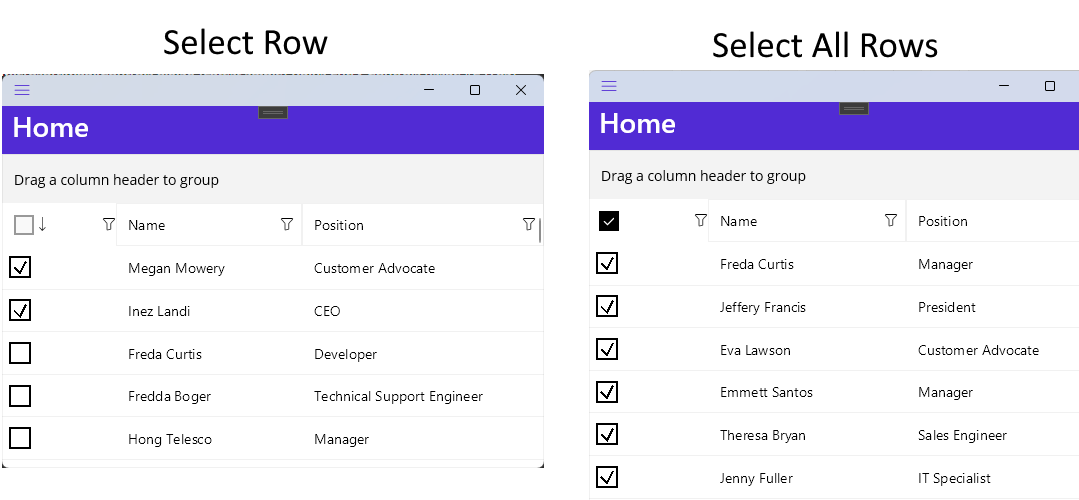Implement Selection Column for DataGrid
Environment
| Version | Product | Author |
|---|---|---|
| 7.1.0 | Telerik UI for .NET MAUI DataGrid | Dobrinka Yordanova |
Description
In a .NET MAUI application, you may want to select a DataGrid row through a column or all grid rows from the header of this column.
Solution
To implement such a column and to avoid the usage of the templates, use the Cell Renderer approach. This approach uses SkiaSharp to draw the elements inside the DataGrid cell. In such scenarios, use a DataGridBooleanColumn with a Skia CellRenderer. The cell renderer will draw a checkbox element in the cell.
Here is the implementation:
1. Draw a CheckBox using the CellRenderer approach.
**1.1** Create a custom `CheckboxColumnRenderer` class that inherits from `DataGridCellRenderer`.
**1.2** Override the `RenderContainer` method and draw the custom control.
public class CheckboxColumnRenderer : DataGridCellRenderer
{
protected override void RenderContainer(DataGridCellRendererRenderContext renderContext)
{
EmployeeDto club = (EmployeeDto)renderContext.Item;
if (renderContext is DataGridSkiaSharpCellRendererRenderContext skRenderContext)
{
this.DrawCheckBox(club.OnLeave, skRenderContext, skRenderContext.Bounds);
}
}
private void DrawCheckBox(bool isChecked, DataGridSkiaSharpCellRendererRenderContext skRenderContext, Rect bounds)
{
double horizontalPadding = 8;
double x = bounds.X + horizontalPadding;
double h = 20;
double y = bounds.Y + (bounds.Height - h) / 2;
double displayScale = skRenderContext.DisplayScale;
// Reusing Height for the width so the checkbox is square
Rect rect = new Rect(x, y, h, h);
var skiaRect = SkiaUtils.ToSKRect(rect, displayScale);
// checkbox border
using var paint = new SKPaint();
paint.Style = SKPaintStyle.Stroke;
paint.Color = SKColors.Black;
paint.StrokeWidth = 2;
skRenderContext.Canvas.DrawRect(skiaRect, paint);
if (isChecked)
{
// checkmark
using var checkMarkPaint = new SKPaint();
checkMarkPaint.Style = SKPaintStyle.Stroke;
checkMarkPaint.Color = SKColors.Black;
checkMarkPaint.StrokeWidth = 2;
var path = new SKPath();
path.MoveTo(skiaRect.Left + 4, skiaRect.MidY);
path.LineTo(skiaRect.MidX, skiaRect.Bottom - 4);
path.LineTo(skiaRect.Right - 4, skiaRect.Top + 4);
skRenderContext.Canvas.DrawPath(path, checkMarkPaint);
}
}
internal static class SkiaUtils
{
public static SKRect ToSKRect(Rect rect, double scale = 1)
{
return new SKRect((float)(scale * rect.Left), (float)(scale * rect.Top), (float)(scale * rect.Right), (float)(scale * rect.Bottom));
}
public static Rect ToRect(SKRect skRect, double scale = 1)
{
return new Rect(scale * skRect.Left, scale * skRect.Top, scale * skRect.Right, scale * skRect.Bottom);
}
}
}
2. In the XAML, set the custom CheckboxColumnCellRenderer class to the DataGridBooleanColumn.CellRenderer property:
<ContentPage.Resources>
<local:CheckboxColumnRenderer x:Key="CheckboxColumnCellRenderer" />
</ContentPage.Resources>
<Grid>
<telerik:RadDataGrid x:Name="EmployeesGrid"
RenderMode="SkiaSharp"
ItemsSource="{Binding Employees}"
AutoGenerateColumns="False">
<telerik:RadDataGrid.Columns>
<telerik:DataGridBooleanColumn PropertyName="OnLeave"
CellRenderer="{StaticResource CheckboxColumnCellRenderer}">
<telerik:DataGridBooleanColumn.HeaderStyle>
<telerik:DataGridColumnHeaderStyle TextMargin="0"
FilterIndicatorMargin="0"
BorderThickness="0" />
</telerik:DataGridBooleanColumn.HeaderStyle>
<telerik:DataGridBooleanColumn.HeaderContentTemplate>
<DataTemplate>
<Grid>
<telerik:RadCheckBox IsChecked="{Binding BindingContext.AreAllItemsChecked, Mode=TwoWay, Source={x:Reference EmployeesGrid}}"
CornerRadius="0"
StrokeWidth="2"
CheckedColor="Black"
Margin="5,0,0,0"
HeightRequest="30"
WidthRequest="30" />
</Grid>
</DataTemplate>
</telerik:DataGridBooleanColumn.HeaderContentTemplate>
</telerik:DataGridBooleanColumn>
<telerik:DataGridTextColumn PropertyName="Name"
HeaderText="Name" />
<telerik:DataGridNumericalColumn PropertyName="Position"
HeaderText="Position" />
</telerik:RadDataGrid.Columns>
</telerik:RadDataGrid>
</Grid>
3. Add a sample data model:
public class EmployeeDto : Employee
{
private bool onLeave;
public EmployeeDto(Employee source)
{
this.Name = source.Name;
this.Position = source.Position;
this.Salary = source.Salary;
this.StartDate = source.StartDate;
this.VacationTotal = source.VacationTotal;
this.VacationUsed = source.VacationUsed;
}
public bool OnLeave
{
get => onLeave;
set => SetProperty(ref onLeave, value);
}
}
4. Add the ViewModel:
public class MainViewModel : ViewModelBase
{
private ObservableRangeCollection<EmployeeDto> employees;
public MainViewModel()
{
Employees = new ObservableRangeCollection<EmployeeDto>(SampleDataService.Current.GenerateEmployeeData()
.Select(e => new EmployeeDto(e))
.Take(40));
}
public ObservableRangeCollection<EmployeeDto> Employees
{
get => employees;
set => SetProperty(ref employees, value);
}
public bool AreAllItemsChecked
{
get => Employees.All(e => e.OnLeave);
set
{
foreach (var employeeDto in Employees)
employeeDto.OnLeave = value;
}
}
}
This is the result:
